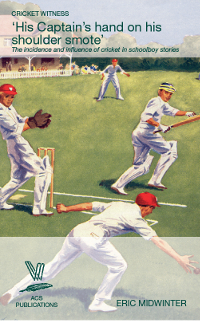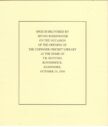‘His Captain’s hand on his shoulder smote’
Martin Chandler |Published: 2019
Pages: 156
Author: Midwinter, Eric
Publisher: ACS
Rating: 3.5 stars

Childhood memories can be unreliable. To this day I have recollections of meetings, activities and conversations that, as I have grown older, I know cannot be correct. The knowledge that I have somehow taken the experiences of others and subconsciously adopted them as my own is at times a little disconcerting.
I make the above point because prior to reading this interesting book from Eric Midwinter, I had always thought that during the years of my earliest memories publications like the Boy’s Own Paper and many other periodicals aimed at a young readership were still around, only beginning to die out as I reached my teens. Thanks to Eric Midwinter however I have now had a few of those memories consigned to the rubbish bin of history. All I could have actually remembered is the comic strips, which seldom featured cricket, and beyond that what I must have been recalling was my father and his contemporaries telling me about what they had read as children.
Midwinter is an academic with a strong track record of cricket writing. He is well into his eighties now but, his 2011 book The Cricketer’s Progress: Meadowland to Mumbai having been Wisden Book of the Year, his writing skills are clearly undimmed and, on the subject of schoolboy cricket in children’s literature his first hand memories are most certainly genuine.
Even Midwinter was not around when the genre began however, back in 1857 with the publication of Tom Brown’s Schooldays (still in print although I am assured by my teacher wife that, at primary school level at least, never now read by children). The chapter regarding Thomas Hughes’ famous novel sets the scene for a history of the scores of imitators that the book inspired and the various periodicals that subsequently jumped on the bandwagon.
There are many names mentioned, prolific writers in their time, who I must confess to never having heard of, including Talbot Baines Read, who wrote the Boy’s Own Paper stories that appeared for many years. Later some more renowned writers touched on the subject and Midwinter mentions in particular Alec Waugh, PG Wodehouse and EW Hornung. Another well known book that receives attention is James Hilton’s Goodbye Mr Chips. Dramatised several times one slightly surprising omission from Midwinter’s account is any mention of Martin Clunes’ 2002 portrayal of the title character.
The narrative then moves on to the writings of Frank Richards about Greyfriars School that feature another name that still resonates, Billy Bunter. These stories initially appeared in The Magnet and, after the Second World War, as novels. There were several other titles like The Magnet, and readers would pass copies around so they were not necessarily ‘in competition’ as such. Midwinter bought his first issue, of a title called The Rover, in 1939 but soon after that wartime paper restrictions changed the market place forever and, as indicated above, by the time I was old enough to have become a reader the ‘story’ based children’s publication, as opposed to the comic strip, was consigned to history.
The first two thirds of ‘His Captain’s hand on his shoulder smote’ is concerned with the historical background of the subject, and the final third to Midwinter reviewing that and reflecting on the current situation, both for the game and children’s literature regarding cricket. He examines how we have got where we are and the relationship between the two.
Inevitably many frequently discussed issues crop up. The sad decline of physical education and sport in state schools is explored, as is the fall in the popularity of cricket as a participation sport. The comparatively limited choice of sources of entertainment that Midwinter’s generation had, and indeed my own, is contrasted with the myriad of options available to the young today. Midwinter’s conclusions are, perhaps inevitably, rather more negative than positive, but he certainly isn’t an old curmudgeon, and ends on an optimistic note.
In the past articles in the ACS journal have visited some of the themes that are explored here, but there has never to my knowledge been a thorough look in book form at this rather curious aspect of the game. Having been looking forward to ‘His Captain’s hand on his shoulder smote’ ever since I first became aware of its impending publication I was certainly not disappointed and, if the subject matter appeals, this one is highly recommended.






Leave a comment